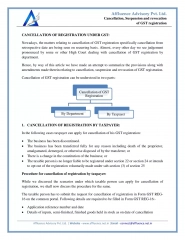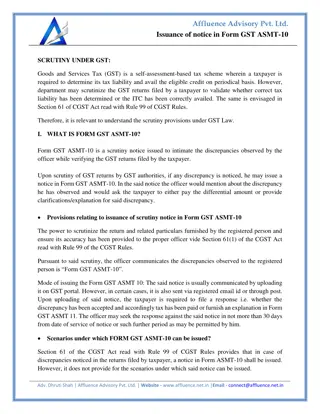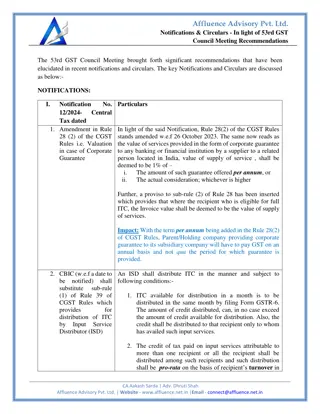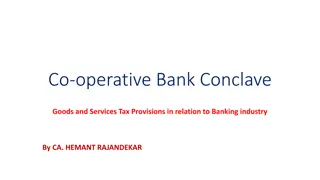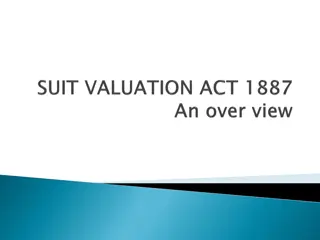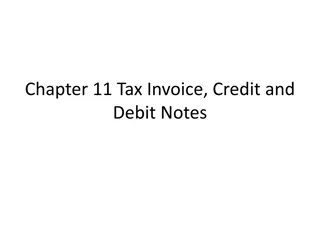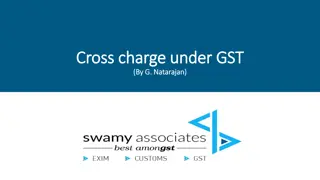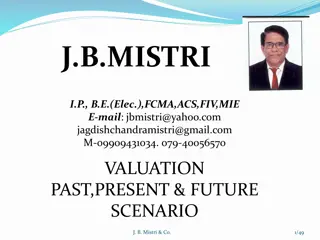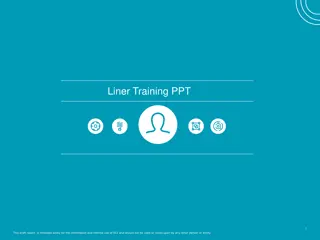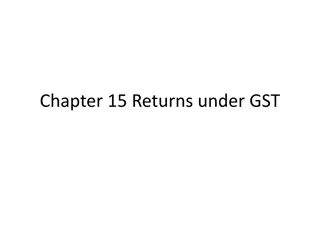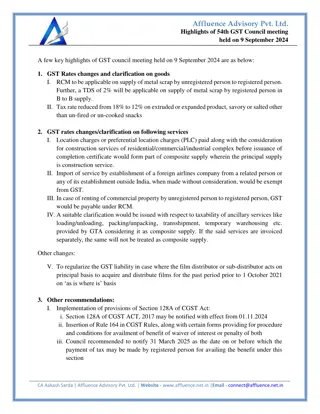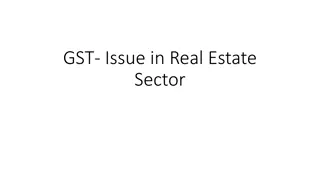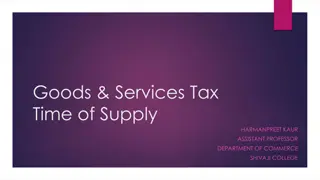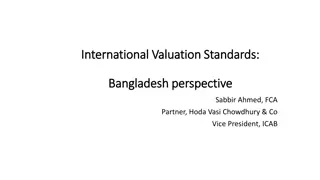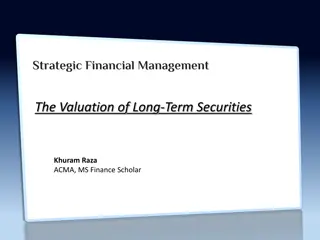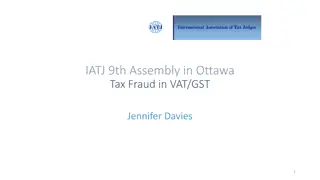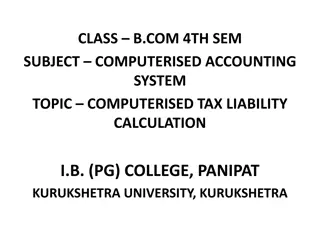Understanding GST Valuation Rules and Consideration in Supply
Explore the concept of consideration in relation to the supply of goods or services under the CGST Act, along with indicators of consideration, supply without consideration scenarios, and implications for GST valuation. Learn about the significance of direct link between supply and consideration, transactions deemed as supplies for GST purposes, and examples of such transactions.
Download Presentation

Please find below an Image/Link to download the presentation.
The content on the website is provided AS IS for your information and personal use only. It may not be sold, licensed, or shared on other websites without obtaining consent from the author. Download presentation by click this link. If you encounter any issues during the download, it is possible that the publisher has removed the file from their server.
E N D
Presentation Transcript
Value of Supply GST Valuation Rules Deepak Mata, Assistant Director, NACEN, Mumbai
Presentation Plan 2 Consideration Section 15 of CGST Act GST Valuation Rules, 2017 2
What is Consideration 3 Consideration in relation to the supply of goods or services or both includes (a) any payment made or to be made, whether in money or otherwise, in respect of, in response to, or for the inducement of, the supply of goods or services or both, whether by the recipient or by any other person but shall not include any subsidy given by the Central Government or a State Government; (b) the monetary value of any act or forbearance, in respect of, in response to, or for the inducement of, the supply of goods or services or both, whether by the recipient or by any other person but shall not include any subsidy given by the Central Government or a State Government: Provided that a deposit given in respect of the supply of goods or services or both shall not be considered as payment made for such supply unless the supplier applies such deposit as consideration for the said supply [Section 2(31)of Model GST Law]
Indicators of Consideration 4 All payments may not be consideration Consideration is different from profit There should be a direct link between the supply and the consideration a reciprocalperformance to the supply a transaction between the parties It should be capable of being expressed in monetary terms
Supply without Consideration 5 Certain transactions made for no consideration will be deemed to be supplies for GST purposes; These need to be valued for charging tax Examples: the permanent transfer/disposal of business assets, where input tax credit has been availed on such assets. Supply of goods or services or both between related persons or between distinct persons as specified in section 25, when made in the course or furtherance of business Provided that gifts not exceeding fifty thousand rupees in value in a financial year by an employer to an employee shall not be treated as supply of goods or services or both non- business use Supply of goods (a) by a principal to his agent where the agent undertakes to supply such goods on behalf of the principal; or (b) by an agent to his principal where the agent undertakes to receive such goods on behalf of the principal. Import of services by a taxable person from a related person or from any of his other establishments outside India, in the course or furtherance of business.
Valuation of Supply 6 Section 15 (1) The value of a supply of goods or services or both shall be the transaction value, which is the price actually paid or payable for the said supply of goods or services or both where the supplier and the recipient of the supply are not related and the price is the sole consideration for the supply.
.. Valuation of Supply 7 Valuation to be done on the basis of transaction value Transaction value shall, inter-alia, include: any taxes, duties, fees and charges levied under any statute other than CGST/SGST/IGST Act interest or late fee or penalty for delayed payment of any consideration for any supply; and subsidies directly linked to the price excluding subsidies provided by the Central Government and State Governments.
Inclusions in Value of Supply? 8 (b) the value, apportioned as appropriate, of such goods and/or services as are supplied directly or indirectly by the recipient of the supply free of charge or at reduced cost for use in connection with the supply of goods and/or services being valued, to the extent that such value has not been included in the price actually paid or payable; (c) royalties and licence fees related to the supply of goods and/or services being valued that the recipient of supply must pay, either directly or indirectly, as a condition of the said supply, to the extent that such royalties and fees are not included in the price actually paid or payable;
Subsidies 9 Section 15(2)(e): The value of supply shall include subsidies directly linked to the price excluding subsidies provided by the Central Government and State Governments Explanation. For the purposes of this sub- section, the amount of subsidy shall be included in the value of supply of the supplier who receives the subsidy. 9
Discounts 1 0 Section 15 (3) The value of the supply shall not include any discount which is given before or at the time of the supply if such discount has been duly recorded in the invoice issued in respect of such supply; and after the supply has been effected (POST SUPPLY DISCOUNTS), if such discount is established in terms of an agreement entered into at or before the time of such supply and specifically linked to relevant invoices; and input tax credit as is attributable to the discount on the basis of document issued by the supplier has been reversed by the recipient of the supply.
GST Valuation Rules 1 1 Section 15 (4) of CGST Act empowers the Government to make Rules. Section 20 of IGST Act and section 21 of UTGST Act states that rules made under CGST Act shall mutatis mutandis, apply for IGST/ UTGST Act Eight Valuation Rules; Concepts taken from Customs and Central Excise- transaction value, CE- captive consumption, Service Tax - pure agent/ reimbursements ) and Customs comparative / related party transactions 11
Consideration not fully in money 1 2 Situation 1: Sale of Maruti Celeria under exchange scheme Price of Maruti Celeria= Rs. 5.9 lacs Exchange Price= Rs. 50,000/- Additional exchange discount = Rs. 20000/- Transaction Value= Rs. 5.2 lacs Open Market Value= Rs. 5.9 lacs Assessable value for GST purpose= Rs. 5.9 lacs ( or 5.7 lacs??) 12
Consideration not fully in money 1 3 Situation 2: Sale of Maruti Celeria under exchange scheme Price of Maruti Celeria= Not known Exchange Price= Rs. 50,000/- Transaction Value= Rs. 5.2 lacs Open Market Value= consideration in money + Money value of non-money consideration =5.2 lacs + 50000/- = Rs. 5.7 lacs Assessable value for GST purpose= Rs. 5.9 lacs ( or 5.7 lacs??) 13
Consideration not fully in money 1 4 Situation 3: Sale of Maruti Celeria under exchange scheme Price of Maruti Celeria= Not Known Transaction Value= Rs. 5.2 lacs Open Market Value= Comparative method =Of like kind and quality = possible??? Assessable value for GST purpose= ??? 14
Consideration not fully in money 1 5 Sale of Maruti Celeria under exchange scheme Price of Maruti Celeria= Not known Exchange Price= Not known Transaction Value= Rs. 5.2 lacs Open Market Value= Money value + money value old car { to be calculated by rule 4( cost plus- not possible as car is old and used) so rule 5( residual method) Assessable value for GST purpose= Rs. 5.2 lacs plus ?? 15
Consideration not fully in money 1 6 Rule 1: Value of supply of goods or services where the consideration is not wholly in money Value of the supply shall, (a) be the open market value of such supply (b) If Open market value is not available, the money value of consideration( in money and not in money) (c) If value not determinable under above clauses, Comparative Method ; Of like kind and quality (d) If Value not determinable under above clauses, sum total of money value of consideration and consideration not in money( as determined by applying rule 4( Cost plus 10%) or 5( Residual method)) 16
Open Market Value? 1 7 (a) open market value of a supply of goods or services or both means the full value in money, excluding the integrated tax, central tax, State tax, Union territory tax and the cess payable by a person in a transaction, where the supplier and the recipient of the supply are not related and price is the sole consideration, to obtain such supply at the same time when the supply being valued is made. (b) supply of goods or services or both of like kind and quality means any other supply of goods or services or both made under similar circumstances that, in respect of the characteristics, quality, quantity, functional components, materials, and reputation of the goods or services or both first mentioned, is the same as, or closely or substantially resembles, that supply of goods or services or both. 17
Rule 2 1 8 Rule 2: Value of supply of goods or services or both between distinct or related persons, other than through an agent (a) be the open market value of such supply; (b) if open market value is not available, be the value of supply of goods or services of like kind and quality; (c) if value is not determinable under clause (a) or (b), be the value as determined by application of rule 4 or rule 5, in that order: Provided where the recipient is eligible for full input tax credit, the value declared in the invoice shall be deemed to be the open market value of goods or services. 18
Supply through Agent 1 9 Rule 3: Value of supply of goods made or received through an agent The value of supply of goods between the principal and his agent shall,- (a) be the open market value of the goods being supplied, or at the option of the supplier, be ninety percent of the price charged for the supply of goods of like kind and quality by the recipient to his customer not being a related person, where the goods are intended for further supply by the said recipient; (b) where the value of a supply is not determinable under clause (a), the same shall be determined by application of rule 4 or rule 5 in that order 19
Rule 4 2 0 Rule 4: Value of supply of goods or services or both based on cost Where the value of a supply of goods or services or both is not determinable by any of the preceding rules, the value shall be one hundred and ten percent of the cost of production or manufacture or cost of acquisition of such goods or cost of provision of such services. 20
Rule 5 2 1 Rule 5 : Residual method for determination of value of supply of goods or services or both Where the value of supply of goods or services or both cannot be determined under rules 1 to 4, the same shall be determined using reasonable means consistent with the principles and general provisions of section 15 and these rules: Provided that in case of supply of services, the supplier may opt for this rule, disregarding rule 4. 21
Rule 6 2 2 Rule 6: Purchase or sale of foreign currency, including money changing (a) For a currency, when exchanged from, or to, Indian Rupees (INR), the value shall be equal to the difference in the buying rate or the selling rate, as the case may be, and the Reserve Bank of India (RBI) reference rate for that currency at that time, multiplied by the total units of currency: Provided that in case where the RBI reference rate for a currency is not available, the value shall be 1% of the gross amount of Indian Rupees provided or received by the person changing the money: Provided further that in case where neither of the currencies exchanged is Indian Rupee, the value shall be equal to 1% of the lesser of the two amounts the person changing the money would have received by converting any of the two currencies into Indian Rupee on that day at the reference rate provided by RBI. 22
Valuation - Money Changer 2 3 Provided also that a person supplying the services may exercise option to ascertain value in terms of clause (b) for a financial year and such option shall not be withdrawn during the remaining part of that financial year.
Valuation - Money Changer 2 4 Example 1: Suppose a company M/s Thomas Cook Ltd, a money changer, converts 1000 Euro into rupees at @ Rs. 90 per Euro. The RBI reference rate for Euro is Rs.88. So the value of the supply shall be = = (Difference in buying rate and RBI reference rate ) X Total Units of currency = ( 90-88) X 1000 = Rs. 2000/-
Valuation - Money Changer 2 5 Example 2: Suppose the RBI reference rate in the above case is not available, The value of supply shall be = 1% of Indian Rupees received = 1% X ( 1000 x 90) = 1% of Rs. 90000/- = Rs. 900/-
Valuation - Money Changer 2 6 Example 3: Suppose in the above case, 1000 Euro is converted into 1300 USD; RBI reference rate for Euro is Rs.88/- and that for USD is Rs. 68/-. So the value of the supply shall be = = 1% of the Lesser of the ( 1000 X 88 and 1300 X 68) =1% of lesser of 88000 and 88400 =1% of 88000 = Rs. 880/-
Valuation - Money Changer 2 7 Option (b) At the option of supplier of services, the value in relation to supply of foreign currency, including money changing, shall be deemed to be (i) one per cent of the gross amount of currency exchanged for an amount up to one lakh rupees, subject to a minimum amount of two hundred and fifty rupees; (ii) one thousand rupees and half of a per cent. of the gross amount of currency exchanged for an amount exceeding one lakh rupees and up to ten lakh rupees; and (iii) five thousand rupees and one tenth of a per cent. of the gross amount of currency exchanged for an amount exceeding ten lakh rupees, subject to maximum amount of sixty thousand rupees.
Travel Agent 2 8 (3) The value of supply of services in relation to booking of tickets for travel by air provided by an air travel agent, shall be deemed to be an amount calculated at the rate of five percent of the basic fare in the case of domestic bookings, and at the rate of ten per cent of the basic fare in the case of international bookings of passage for travel by air. Explanation - For the purposes of this sub-rule, the expression basicfare means that part of the air fare on which commission is normally paid to the air travel agent by the airline.
Life insurance business (ULIP type) 2 9 (4) The value of supply of services in relation to life insurance business shall be: (a) the gross premium charged from a policy holder reduced by the amount allocated for investment, or savings on behalf of the policy holder, if such amount is intimated to the policy holder at the time of supply of service; (b) in case of single premium annuity policies other than (a), ten per cent of single premium charged from the policy holder; or (c) in all other cases, 25% of the premium charged from the policy holder in the first year and 12.5% of the premium charged from policy holder in subsequent years: Provided that nothing contained in this sub-rule shall apply where the entire premium paid by the policy holder is only towards the risk cover in life insurance.
Second hand goods 3 0 (5) Where a taxable supply is provided by a person dealing in buying and selling of second hand goods i.e. used goods as such or after such minor processing which does not change the nature of the goods and where no input tax credit has been availed on purchase of such goods, the value of supply shall be the difference between the selling price and purchase price and where the value of such supply is negative it shall be ignored.
Second hand goods- Example 3 1 A person sells his Maruti Alto car to a company Mahindra first choice for Rs. 50000/-. The company refurbishes the car and adds some material worth Rs.20000/- and further sells the car for Rs. 90000/-. Whether the first Supply from the person to company is taxable? What should be the taxable value for GST purposes? On the first supply? On the second supply from company?
Vouchers 3 2 (6) The value of a token, or a voucher, or a coupon, or a stamp (other than postage stamp) which is redeemable against a supply of goods or services or both shall be equal to the money value of the goods or services or both redeemable against such token, voucher, coupon, or stamp.
Vouchers- Example 3 3 A company purchases Sodexo coupons worth Rs. 2000/- for Rs. 1800/-, valid for and gifts it to one faculty for taking a lecture on GST to its employees What should be the taxable value of the coupons?
3 4 (7)The value of taxable services provided by such class of service providers as may be notified by the Government on the recommendations of the Council as referred to in Entry 2 of Schedule I between distinct persons as referred to in section 25, other than those where input tax credit is not available under sub- section (5) of section 17, shall be deemed to be NIL.
Valuation Pure Agent 3 5 Example NACEN conducts training programme for VAT Dept and charges a fees to Rs. 20000/- VAT wants some chocolates / prizes / gifts to participants and orders a company say M/s Cadbury; Value Rs.100,000/- Goods arrive at NACEN and NACEN pays for it and get reimbursed from VAT Dept NACEN is a pure agent for such goods Value of service by NACEN will not include Rs.1, 00,000/- provided all eight conditions are met
Valuation Pure Agent 3 6 Pure Agent Meaning Certain expenditure or costs incurred by the service provider as pure agent of recipient of service, to be excluded from the value of taxable service subject to following conditions; the service provider acts as a pure agent of the recipient of service when he makes the payment to third party for the goods or services procured the recipient of service receives and uses the goods or services so procured by the service provider in his capacity as pure agent of the recipient of service the recipient of service is liable to make payment to the third party the recipient of service authorizes the service provider to make payment on his behalf
.. Valuation Pure Agent 3 7 the recipient of service knows that the goods and services for which payment has been made by the service provider shall be provided by the third party the payment made by the service provider on behalf of the recipient of service provider has been separately indicated in the invoice issued by the service provider to the recipient of service the service provider recovers from the recipient of service only such amount as has been paid by him to the third party the goods or services procured by the service provider from the third party as a pure agent of the recipient of the service or in addition to the services he provides on his own account
Rate of exchange 3 8 8. Rate of exchange of currency, other than Indian rupees, for determination of value The rate of exchange for determination of value of taxable goods or services or both shall be the applicable reference rate for that currency as determined by the Reserve Bank of India on the date when point of taxation arises in respect of such supply in terms of section 12 or, as the case may be, section 13 of the Act.


